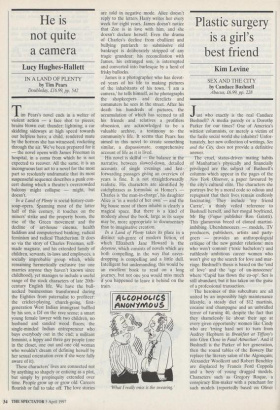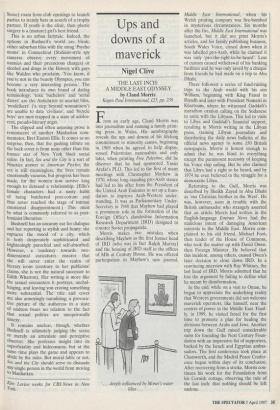Plastic surgery is a girl's best friend
Kim Levine
SEX AND THE CITY by Candace Bushnell Abacus, £6.99, pp. 228 Just who exactly is the real Candace Bushnell? A media parody or a Dorothy Parker for our times? One of America's wittiest columnists, or merely a victim of the facile social world she inhabits? Unfor- tunately, her new collection of writings, Sex and the City, does not provide a definitive answer.
The cruel, status-driven mating habits of Manhattan's physically and financially privileged are the. subject of Bushnell's columns which appear in the pages of the New York Observer, a paper favoured by the city's cultural elite. The characters she portrays live by a moral code so odious and repugnant that their lives remain endlessly fascinating. They include 'my friend Carrie', a thinly veiled reference to Bushnell herself, and her mogul boyfriend, Mr Big (Vogue publisher Ron Galotti). This glamorous breed of cloned martini- imbibing Ubershmoozers — models, TV producers, publishers, artists and party- goers — provides an anthropological critique of the new gender relations: men who won't commit (`toxic bachelors') and ruthlessly ambitious career women who won't give up the search for love and mar- riage. Bushnell's thesis is based on the 'end of love' and the 'age of un-innocence' where 'Cupid has flown the co-op'. Sex is still abundant, but it has taken on the guise of a professional transaction.
The heroines of this subculture are all united by an impossibly high maintenance lifestyle, a steady diet of $12 martinis, cocaine and champagne and an unbridled terror of turning 40, despite the fact that they shamelessly lie about their age at every given opportunity: women like Cindy who are 'trying hard not to turn from Audrey Hepburn in Breakfast at Tiffany's into Glen Close in Fatal Attraction'. And if Bushnell is the Parker of her generation, then the round tables of the Bowery Bar replace the literary salon of the Algonquin; Alexander Woollcott and Robert Benchley are displaced by Francis Ford Coppola and a bevy of young drugged models. Characters such as Gregory Roque, a conspiracy film-maker with a penchant for such models (reportedly based on Oliver Stone) roam from club openings to launch parties to trendy bars in search of a trophy partner. If youth is the elixir, then plastic surgery is a (mature) girl's best friend.
This is no urban fairytale. Indeed, the options in Bushnell's world are bleak; either suburban bliss with the smug 'Psycho moms' in Connecticut (Stalinist-style spy cameras observe every movement of nannies and their precocious charges) or alcohol and drugs in the Bowery with guys like Walden who proclaim, 'You know, if you're not in the beauty Olympics, you can become a very interesting person.' The book introduces its own brand of dating terminology; 'wide bachelors' and 'serial daters' are the Antichrists to marital bliss, `modelisers' Ca step beyond womanisers') are unable to date 'civilians', and 'bicycle boys' are men trapped in a state of adoles- cent, pseudo-literary angst.
The clipped and often amusing prose is reminiscent of another Manhattan com- mentator, Bret Easton Ellis. It comes as no surprise, then, that the gushing tribute on the back cover is from none other than this former star of New York black social satire. In fact, Sex and the City is a sort of Nineties answer to American Psycho; the sex is still meaningless, the lives remain emotionally vacuous, but progress has been made, for the women now survive long enough to demand a relationship. (Ellis's female characters had a nasty habit of being butchered post-coitum and thus never reached the stage of intense emotional disappointment.) This must be what is commonly referred to as post- feminist liberation.
Bushnell has an uncanny ear for dialogue and her reporting is stylish and funny; she captures the mood of a city, which is both desperately sophisticated and frighteningly parochial and self-absorbed. However, a tendency towards two- dimensional caricatures ensures that she will never enter the realm of literary icons (contrary to her publicists' claims, she is not the natural successor to Edith Wharton). Her writing is more like the sexual encounters it portrays, unchal- lenging, and leaving you craving something more substantial. The title and cover are also annoyingly tantalising; a provoca- tive picture of the authoress in a state of undress bears no relation to the fact that sexual politics are unequivocally unsexy.
It remains unclear, though, whether Bushnell is ultimately judging the scene or merely an articulate and perceptive observer. She professes insight into its superficiality and hideousness, but at the same time plays the game and appears to abide by the rules. But moral fable or not, Sex and the City should serve to dissuade any single person in the world from moving to Manhattan.
Kim Levine works for CBS News in New York.



























































 Previous page
Previous page